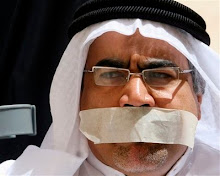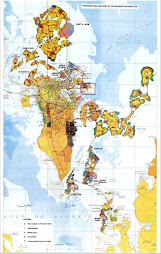حق: حركة الحريات والدموقراطية- البحرين
مكتب حقوق الإنسان ..Human Rights Bureau
www.haaq.org, Email: HAAQ.Bahrain@gmail.com
With the complicity of the Public Prosecution and to elicit confessions:
MOI officers pursue torture against defendants in criminal cases
March 17, 2010
The Human Rights Bureau of the HAQ Movements expresses its serious concerns about resurfacing of torture and coercion to confession by officers of Ministry of Interior. Moreover, the concerns are extended to the role of the Public Prosecution in colluding with them to approve the confessions extracted under torture. Reports have indicated that defendants in criminal cases were subjected to torture and ill-treatment by officers and officials in the Department of Economic Crimes and Money Laundering of the General Directorate of Criminal Investigation (CID) to coerce them to confess to themselves and others[1]. The same reports assert the existence of collusion between the Public Prosecutor and the Interior Ministry to put pressure on the accused by giving them the choice between signing of prepared and ready confessions or go back to the CID again, indicating the exposure to ill-treatment and torture. This is not the first time that reference is made to the adoption of methods of torture by the security services to compel defendants to confessions and to the role of the Public Prosecutor in coercion into signing ready confessions. However, all allegation cases have been faced with utter denial by the Authorities that failed, until this moment, to form impartial and independent inquiry committees to investigate accusations of torture against officials and those repeatedly involved in torture.
The Higher Criminal Court on Sunday 16 May 2010 witnessed testimonies in bribery charges in which accused are a number of inspectors from the Department of Tourism of the Ministry of Culture and Information and some investors and hotel owners. These testimonies assert the continued adoption of torture and coercion in the Ministry of the Interior as a means to elicit confessions from the accused. In this case, the Public Prosecution (PP) accused six officials from the Ministry of Information of receiving bribes from 11 investors and hotel owners; cash and in-kind benefits, in exchange for not issuing violations against their tourist premises. All defendants denied all charges assigned to them and further emphasized that the confessions in the PP documents were the result of coercion by its investigators and the threat to return to the CID to be exposed to the same treatment as before, in reference to physical and psychological torture.

With regard to torture, all the defendants referred to the exposure to inhumane treatment by a specific officer in the Department for Combating Economic Crimes and Money Laundering of the General Directorate of Criminal Investigations at the Ministry of Interior. A brother of the first defendant testified that:"When he visited his brother in custody in the
CID he observed scores and traces of beatings on his body. When inquired about it, his brother told him that he was beaten during detention to extract a confession by force. After transferred to the prosecution, he said he had signed his statement at the Public Prosecution without seeing it. In fact he was not allowed to do so".[4]

It should be noted that the Combating Economic Crimes and Money Laundering of the General Directorate of Criminal Investigations, a new name for the Unit for Combating Money Laundering and Terrorism Financing, is led by Major Bassam Mohammed Khamis Al-Maraj since its inception in 2001. Reports indicate that before moving entirely to the current administration, he was part of the team interrogating detainees of previous incidents in the new millennium. Al-Maraaj was coherently integrated in the team with the well known torturers Fahd Al-Fadhala and Esa Al-Majali, who are still engaged in the same roles of torture and ill-treatment of detainees.
Al-Maraj, was then a Captain in the CID, played the semi-final role of seeing the detainees after they have been tormented with torture and suffering and work on to extract confession by giving further commands of beatings and torture of the detainee as well as the threat to rape the detainees women had it been wives, mothers or sisters. Al-Maraj has witnessed, together with Fahd Al-Fadhala and other officers, the attack on one of the activist when he was stripped of his clothes and, while chained by the hands and legs, a solid stick was forced into his anus.

Bassam Al Maraj, Yousef Al-Arabi, Fahd Al-Fadhala and Esa Al Majali, whose role was securing confession by inducing pain and deployment of torturous practices and ill-treatment of detainees, were mentioned in "Torture Redux: The Revival of Physical Coercion during Interrogations in Bahrain", a report recently published by Human Rights Watch about torture in Bahrain[7].
HAQ calls for the following:
1 - Stop the practice of torture as a means to coerce detainees and victims of protests for confession up on themselves or others. It includes extraction of admission by inducing physical and psychological pain and suffering to them and their families, which is contrary to basic international human rights norms and charters.
2 – Dismiss all officials and members of the security individuals, from their posts, then prosecute those responsible for torture in the previous period and until this moment. This involves the recruitment of new national staff who has not been associated, in any way, of responsibilities and the consequences of inhumane treatment and torture of the detainees in prisons, detention and exile.
3 - Refrain from bringing and deployment of foreign mercenaries and torture experts from Egypt, Jordan, Iraq and other nationalities in any of the security establishments.
4 – Revoking Decree-Law No. 56 of 2002 or amend it such that it complies with human rights values, allowing for prosecuting those responsible for torture in the previous period , to ensure non-recurrence of such gross violations of human rights.
5 - Allowing all victims of torture in the previous period to prosecute and bring to justice those involved - directly or indirectly – in torture, inhuman and degrading treatment inside and outside of prison, with no distinction as to the post or rank of any of those responsible officials or their social status.
6 - Compensating and redress (physical and moral) victims of torture by the authority which bear the responsibility of the officials in the security establishments.
7 - Signing the Additional Protocol to the Treaty on Torture, which Bahrain acceded in 1989, which allows victims to bring cases directly to the United Nations Committee Against Torture.
[2] http://gulf-daily-news.com/NewsDetails.aspx?storyid=278169
[3] http://www.bahrainrights.org/en/node/2965
[4] http://alayam.com/Articles.aspx?aid=20661
[5] http://www.bahrainrights.org/en/node/3040
[6] http://www.alwasatnews.com/2733/news/read/375845/1.html
[7] http://www.hrw.org/en/reports/2010/02/08/torture-redux-0







